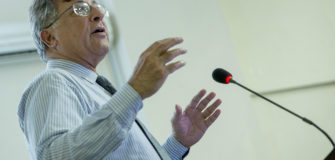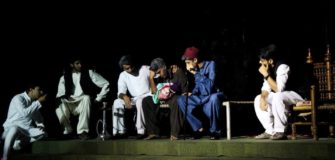Meet Frtiz Böhmler: the man who is improving lives all around Pakistan, one tiny start-up at a time.
Share

Counsuldents: Can you please tell us a little bit about yourself?
Mr. Böhmler: I am originally an entrepreneur, with a master’s degree in business and social sciences from a highly prestigious university of Europe, and an eye for potential long term markets, where investments will yield attractive returns in the foreseeable future. In Pakistan I focus on conceptual consultancy and implementation of need based and mandatory financially sustainable projects related to solar produced energy.
Consuldents: Why did you choose to work on solar power?
Mr. Böhmler: Even as far back as 30 years ago, I believed that climate change will be real. In the recent past, we have already seen several tsunamis and floods in Europe, where there were cars floating around on the streets. Sometimes, even the roofs of the houses got blown away. Thus, I decided already at that time that I want a better future for my children- and you have to work for the things that you want, so instead of following up on my family’s 180 years old company, I started working on solar energy.
Consuldents: How did you first come to Pakistan?
Mr. Böhmler: I had been working with solar power for 20 years when, in 2010, things went south for solar power in Europe. I was looking for new areas to invest into, when one of my salesman told me that he had a friend in Pakistan, who was looking to build the first 50 Mega Watt EPV solar system in Pakistan- this would later go on to become the 100 Mega Watt Quaid-e-Azam Solar Park, built by the Chinese.
Finding out that Pakistan is one of the top 10 countries which affected, with a lot of sun but practically very little knowledge about the solar power, I saw a huge demand for my professional expertise and this made me set up shop far away from home.
Consuldents: What is it that you are currently focusing on in Pakistan?
Mr. Böhmler: Currently, I have several ventures keeping me busy in Pakistan. but, two of them, solar-powered-drip-irrigation, and entrepreneurship workshops, are the ones that take up a good part of my time here. However, I am also working on solarized milk cooling, and solarized desalination. Moreover, I have served as a visiting faculty member at Agriculture University Faisalabad, for the Punjab Government’s project to implement solar cells as the power source for drip irrigation systems. This further led to several other universities contacting me, and soon I would be offering them my expertise as well.
Consuldents: Why did you start with focus on drip irrigation in Pakistan?
Mr. Böhmler: Though my goal is to provide any type of need-based solutions- specially for the rural areas of Pakistan- the water level of the country is dropping drastically, and being an agriculture centered country, it is very adversely affecting Pakistan. Drip irrigation conserves water, and has the potential to increase productivity and income of small farmers substantially; whilst, solar power allows even the farms with no electricity, to use drip irrigation.
Whilst solar-powered-drip-irrigation has many potential benefits, even the projects which are created in the best of interest, have several flaws in them. However, this is why I conduct lectures in various universities, so that the students can work out these flaws, and implement the solutions.
Consuldents: The solutions you are offering are designed to be sustainable but, how long do you think it would take for the country to adopt them?
Mr. Böhmler: Honestly, I think too long. I say that because Pakistan has a very big problem when it comes to adopting new technologies. Firstly, there’s a lot of poverty; farmers usually choose whatever has low up-front costs, while totally neglecting the potentially huge increase in productivity, which could have taken place by adopting a system with a higher upfront installation cost. Secondly, there’s a huge problem of seeing is believing. People do not trust your solutions, because they don’t see them being implemented elsewhere, however, because of the first problem, they would probably never even get to see the system implemented in the first place. Lastly, the people who do not need these solutions, sometimes implement them, which is very financially unadvisable. For instance, it’s not advisable for anyone with a sufficient water supply to use expensive drip-irrigation systems, instead of just flooding his fields.
Consuldents: How do you think we can accelerate the progress on these sustainable irrigational techniques?
Mr. Böhmler: You need to equip specially the poor farmers with more knowledge, instead of just subsidizing their investment, and to ensure they take ownership. That’s what I am fighting: a better transfer of knowledge to farmer, independent of businessmen. However the lack of practical knowledge of universities here is a huge draw back. This is where I see one of several professional roles of mine in Pakistan where I can contribute for the sake of poor farmers.
Consuldents: You also talked about your entrepreneurship workshops, can you please elaborate on those a little?
Mr. Böhmler: I have a friend who is teaching in Jamshoro. He told me that a lot students do not have jobs, and instead of looking for them, they should be equipped with skills that allow them to become job givers themselves- in other words, an entrepreneur. My first workshops were in Larkana, and Jamshoro. The surprisingly overwhelming feedback I received encouraged me to continue and to offer my services to further Universities. I currently have another workshop scheduled for 19th, and 20th November.
These workshops are like tiny business competitions. I bring like-minded people together, which allows them to make up for each other’s lacking abilities, and provide them a platform where they can work together to come up with ideas in two to three days. Afterwards, I declare one of the groups victorious, and help them in securing funds for their idea, via banks and private investors.
Consuldents: What would you suggest the students of Pakistan should do about the problems that the country faces?
Mr. Böhmler: They can contribute to their future by becoming true entrepreneurs. They need to realize that even small business ideas will serve as a viable source of income, instead of trying to get a job at a corporate giant, which will be continuously downsizing its staff due to digitalization.
The key is to identify need-based solutions to the problems that the country- or even the local community- is facing right now, and offering solutions for them. This may seem like you’re profiteering off of people’s problems, but it’s the exact opposite of that. Not only would you be providing solutions to the problems, but also giving jobs to people, and improving the economy of the country; thus, you, in turn, would not only be solving just the problems you were focused on, but many others along with it.
They also need to make sure that they don’t hold back just because of the high-risk factor associated with start-ups. They need to realize that with careful planning, risks can be reduced to a manageable level, however, holding back wouldn’t do anyone any good. Thus, with the proper planning, they can not only be successful financially, but also help their fellow countrymen, thereby bringing about a revolution, which serves to improve the quality of life, all around the country.






